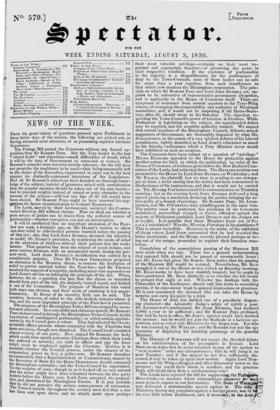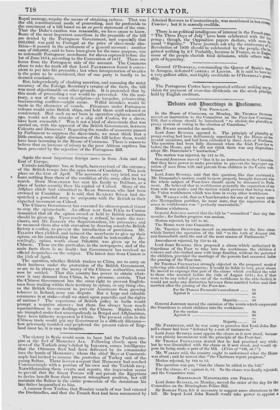NEWS OF THE WEEK.
FROM the great variety of questions pressed upon Parliament in these latter days of the session, the following are picked out, as having attracted most attention, or as possessing superior intrinsic importance. The Postage Bill passed the Commons without any formal op- position from Sir ROBERT PEEL. But the Tory leader to the last " hinted faults" and objections—small difficulties of detail, which it will he the duty of Government to surmount or remove. Sir ROBERT'S remarks were not even strictly relevant ; for the bill does not prescribe the machinery to be used—that being necessarily left to the choice of the Executive, empowered to carry out in the best manner the distinctly-expressed intentions of the Legislature. Had all Sir ROBERT'S objections been founded on thorough know- ledge of the subject, instead of ignorance mixed with mortification that the popular measure should be taken out of his own hands— had lie paraded weighty instead of unreal or petty obstacles to the success of the scheme—still not one line of the bill would have been altered. Sir ROBERT PEEL ought to have reserved his sug- gestions for future communication to Colonel MAimarxr. The Lords, moved by their LYNDIIURST, accepted the Contro- verted Election Bill without change. Now we shall see whether a pure stream of justice can be drawn from the polluted source of partisanship—whether corruption can put on incorruption. It will be recollected that an important alteration of the Poor- law was made a fortnight ago, on Mr. DARBY'S motion to allow out-door relief to able-bodied persons married befbre the passing of that law ; also, that Lord JOHN RUSSELL declared his intention to modify Mr. DARBY'S provision, by restricting the mode of relief to the admission of children without their parents into the work- houses. That question has been the subject of much debate, and some curious divisions, with an unexpected result, during the pre- sent week. Lord JOHN RUSSELL'S modification was carried by a considerable majority. Then Sir Ttiosias FREMANTLE proposed an alteration in the RUSSELL clause, to remove the limitation of relief to parties married before the Poor-law ; and Sir Tnomas received the support of a majority, including many who opposed even Lord JOAN'S motion as infringing the principle of the Act. When, however, the man question was put, that the clause so amended should form part of the bill, the majority turned round, and kicked it out of the Committee. The purpose of Members who voted both ways was obvious, and their mode of attaining it not unpar- liamentary. In favour of its morality little can be said. The question, however, of relief to the able-bodied, remains where it was, and the most important principle of the Poor-law is preserved. The progress of the Birmingham Police Bill was stopped by an un- foreseen obstacle. In a very artful and elaborate speech, Sir ROBERT PEEL endeavoured to damage the Birmingham Town-Council, by the imputation of unmitigated partisanship ; to which certain appoint- ments by the Council gave a colour. They had selected for two re- , sponsible offices persons whose connexion with the Chartists had been notorious, though now dissolved. The Council itself consisted almost entirely of one party. Now, argued Sir ROBERT, the body which could thus openly patronize Chartism, from which their town has suffered so severely, are unfit to officer and pay the force which must be employed against the Chartists. Besides, it is doubtful whether the Council possess, under the charter of in- corporation, power to levy a police-rate. Sir ROBERT therefore recommended, that a Superintendent or Commissioner, named by
the Secretary of State for the Home Department, should command the Birmingham constables, and the Town-Council be superseded. To the surprise of some, though to us it looked all so very natural that the scene might have been rehearsed between the two party
leaders before the House met, Lord JOHN accepted the proposi- tion, and abandoned his Birmingham friends. It is just possible
that he did not perceive the serious consequences of concession. The Town-Councils throughout the country must feel that a slur has been cast upon them, and an attack made upon perhaps their most valuable privilege—certainly on their most im- portant and appropriate function—of preserving the peace in
their respective localities. If the existence of partisanship in the majority is a disqualification for the performance of duty by the 'I own-Councils, none of these bodies can be safe for inure than a year together, from such interference as that which now menaces the Birmingham corporation. The prin- ciple on which Sir ROBERT PEEL and Lord JOHN RUSSELL act, ap- pears to be subversive of 'representative government altogether, and is applicable to the House of Commons itself. There are symptoms of resistance front several quarters to the Tory-Whig scheme of swamping the respectability and authority of Municipal assemblies ; and it would not be surprising if the Home-Secre- tary, after all, should recur to his first plan. The objection re- specting the Town-Council's power of taxation is frivolous. While Parliament is legislating on the subject, the apprehended defect may be supplied, and the requisite authority created. We suspect that certain members of the Birmingham Council, hitherto stanch supporters of Government, are thoroughly disgusted by what Mr. SCHOLEFIELD, in the course of a very spirited defence of his Liberal constituents, rightly described as Lord JOHN'S reluctance to stand by his friends,—reluctance which a Tory Minister never would have exhibited on such an occasion.
The Commons have been valiant on a question of "privilege." Messrs. HANSARD appealed to the House for protection against another action for libel, to which the publication, by order of the House of Commons, of evidence given before the New Zealand Com- mittee of the Lords, had subjected them. The HANSARD petition was presented to the House by Lord JOHN RUSSELL on Wednesday ; and Mr. PoLAcic, the plaintiff; lost no time in sending to one newspa- per at least, a letter stating that the action had been commenced in disobedience of his instructions, and that it would not be carried on. The Morning Post hadreceived this communication on Thursday morning ; but in the evening Lord JOHN RUSSELL delivered a long speech prefacing a resolution declaring the parties bringing the ac- tion guilty of a breach of privilege. Sir ROBERT PEEL, Dr. Limn- MOWN, and Mr. O'CoRNELL were grandiloquent in the same vein. The printer must be protected, the privileges of the Commons maintained, proceedings stopped in limine, offenders against the majesty of Parliament punished, Lord DENMAN and the Judges set at nought. Is it possible that these Members knew not of Po- rAc K'S submission ? Was the Morning Post alone in his confidence This is almost incredible. However, in the midst of the explosion of cheap valour, Lord JOIIN announced that he had received the letter mentioned ; and the House, secretly pleased perhaps at be- • ing out of the scrape, proceeded to register their harmless reso- lution.
Complaints of the surreptitious passing of the Shannon Bill were made when too late. There was a general understanding that opposed bills should not be passed at unseasonable hours ; and Mr. ELLIS had given Mr. SPRING RICE notice that the passing of the Shannon Bill would be resisted. Nevertheless, Mr. Ries smuggled it out of the House at two o'clock on Saturday morning. Mr. ELLIS seems to have been shabbily treated ; but he ought to have questioned Mr. RICE distinctly as to whether the bill would be pressed that night or not. Whoever has dealings with the Chancellor of the Exchequer, should nail him down to something precise, if he can—never trust to general impressions or promises. He is now considered the cleverest who can take the Rouse by surprise and carry his point by a trick. The House of Jobs has ratified one of a peculiarly disgust- ing character—the Admiralty Judge's salary of 4,0001. a year. Dr. LUSIIINGTON'S predecessor, Sir JOHN NICHOLL, had declared 3,0001. a year to be sufficient ; and Sir RODERT Pm, professed, that had he been in office, Sir JOHN'S opinion would have decided the amount : but he would not join the Radicals in a factious op- position, and so voted with Ministers-for the larger sum. For this
he was taunted by Mr. WAKLEY ; and Sir Ronitar lost not the op- portunity of displaying his insulting patronage of the grateful Ministry.
The Marquis of NORMANDY will not escape the dreaded debate on his administration of the prerogative in Ireland. Lord BROUGHAM states that he never intended to put off his motion to " next session " under any circumstances ; that he will bring it on next Tuesday ; and if the subject be not then sufficiently dis-
cussed, it may be taken up again next session. Again Lord Non- INIAXBY and his Whig colleagues and allies discovered terror at the prospect : but surely their alarm is needless, and the gracious Duke will shield them from a condemnatory vote! : .
The Lords have rejected the bill for suppressing the P Slave-trade,—a measure whose extraordinary character Ire, some pains to expose in our last number. The Duke of W. TON delivered a statesmanlike speech against 3i The .di Ministers, having any complaint against a foreignThwer, was to I the case fully before Parliament, and, if necessary; ht the Xoltait Royal message, require the means of obtaining redress. That was the old, constitutional mode of proceeding, and far preferable to the enactment of a bill based on an ex parte statement of the case. That the 'Duke's caution was reasonable, we have cause to know. Some of the most important assertions in the preamble of the bill are denied by the Portuguese Government, and especially that 600,0001. was paid to Portugal as the price of slave-trade abo- lition—it passed in the settlement of a general account : another sum of 300,0001., said to have been given for the same purpose, was to indemnify Portuguese merchants for slaves captured before the 1st of June 1814, according to the Convention of 1817. These are items from the Portuguese side of the account. The Commons chose to take for truth all that Lord PALMERSTON found it conve- nient to put into his preamble ; but when interpretation of treaties is the point to be considered, that of one party is hardly to be deemed conclusive.
But, independently of clashing assertion, and assuming the strict accuracy of the Foreign Secretary's version of the flicts, the bill was most objectionable on other grounds. It is pretended that by this mode of proceeding a war would be prevented. On the con- trary, a war of the worst description—an irregular, privateering, buccaneering conflict—might ensue. Wilful mistakes would be made in the character of vessels. Privateers under Portuguese colours would seize British ships, and hold them until released or condemned. Had such an act been in operation eighteen months ago, would not the mistake of a ship with Coolies, fora slaver, have been excusable ? Was it not a kind of slave-trade that was carried on, with the approval of the British Government, between Calcutta and Demerara ? Regarding the results of measures passed by Parliament to suppress the slave-trade, we must think that a little caution, some slight discussion of the bill before them, would have been becoming in the House of Commons. There is reason to believe that an increase of misery to the poor African captives has been prevented by the rejection of the Portuguese Bill.



























